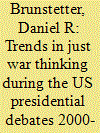|
|
|
Sort Order |
|
|
|
Items / Page
|
|
|
|
|
|
|
| Srl | Item |
| 1 |
ID:
144760


|
|
|
|
|
| Summary/Abstract |
Life in fishing communities is difficult in most countries in South East Asia. In the Philippines, where this study took place, income from fishing has become even more disastrously low in recent years, with more and more fishing grounds yielding less fish due to overexploitation and uncontrolled illegal fishing. In the fishing community considered in this paper, aside from diversifying sources of income, kinship ties provide a safety net in a rather different sense. People deploy kinship in a deliberately strategic way: they limit their everyday interactions with kin, choosing to be intimate only with a select few. The rationale behind this practice is clear: by choosing a select few with whom they have a reciprocal relationship when it comes to sharing goods and services, they are able to manage their resources well and survive tough economic times. Such a practice of 'forgetting kin', however, has implications for the community's conceptualization of the configurations of kinship, as well as its social cohesion and prospects for political activism, undermining the very economic survival it tries so hard to serve.
|
|
|
|
|
|
|
|
|
|
|
|
|
|
|
|
| 2 |
ID:
151624


|
|
|
|
|
| Summary/Abstract |
This article presents the cases of two migrant men, a Senegalese and a Nigerian, who spent many years in Istanbul. Although their backgrounds, personalities and circumstances were different, they both did export-related commercial work in the city. After describing sub-Saharan migration to Turkey and the literature concerning it, the text focuses on the stories these migrants spontaneously presented as they explained why they had become migrants. It was striking that with very different personal details, events and coincidences, both stories attribute the decision to migrate to Istanbul to a traumatic accident that forced the protagonists to change a life that until that point did not involve transnational migration. In the stories the protagonist's ambition, determination and will are rendered invisible and he is presented as a victim. I call this rhetorical topos ‘great mishap’. It resonates with stories I have heard from other migrants. I interpret it as an expression of compunction, of social responsibility weighing on the actor for abandoning close others in favour of an individual quest for self-realisation.
|
|
|
|
|
|
|
|
|
|
|
|
|
|
|
|
| 3 |
ID:
131698


|
|
|
|
|
| Publication |
2014.
|
| Summary/Abstract |
In this article, I explore the place of the just war tradition in US foreign policy by examining the use of just war language in the presidential debates in 2000 (Bush-Gore), 2004 (Bush-Kerry), 2008 (McCain-Obama), and 2012 (Obama-Romney). While critics focus on the use and abuse of just war language as rhetorical gloss to persuade the public an upcoming conflict is morally legitimate while serving the national interest, the debates showcase just war principles as part of a language of critical engagement. Each debate cycle allowed for critical reflection on the foreign policy decisions and just war philosophy of the incumbent president. During the time period I examine, the process of critical engagement identified two moral shortcomings of the past - the failure to act to stop the genocide in Rwanda and the premature use of force in Iraq. These perceived failures catalysed convergence, across party lines, on the way some jus ad bellum principles were understood: Just cause as including the moral obligation to intervene in some way to stop genocide and the renewed salience of the principle of last resort. There remained, however, stark differences in the way legitimate authority was understood.
|
|
|
|
|
|
|
|
|
|
|
|
|
|
|
|
|
|
|
|
|